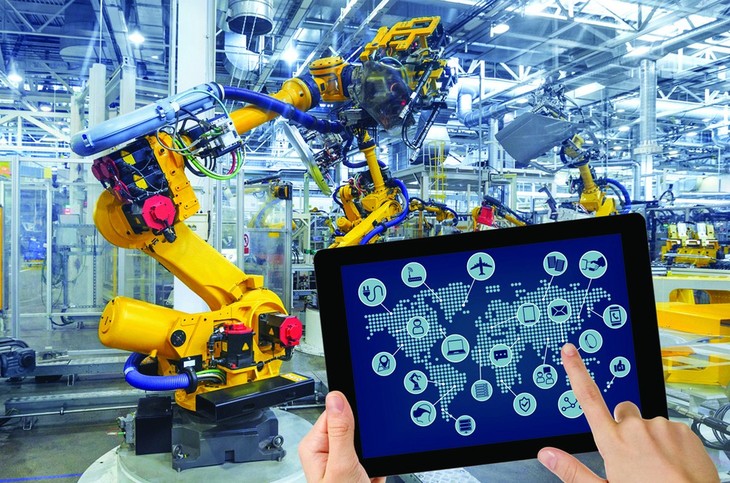(VOVWORLD) - Industrial Revolution 4.0 is changing business and production models in a dramatic way. Global competition is now based on competitiveness instead of price or low labor cost. Vietnamese enterprises are taking the right steps to grasp existing opportunities and establishing a firm foothold in the market.

The world is forecast to have about 20 billion connected devices by 2020.
(Photo: congly.vn)
|
E-commerce and digital technology are creating great opportunities for Vietnamese businesses to enter the world market and participate in the global value chain. Currently, a small or micro business can enter the world market or conduct business transactions with just one computer and a smartphone.
But to access the world market on the global standard, Vietnamese enterprises must fundamentally improve their capacity to adapt.
Nguyen Manh Hao, CEO of the American English School, a leading training brand in Vietnam, said AMES has prepared for a long time.
“We set up an IT team many years ago and are proud to be the first company in Vietnam to create a foundation for students nationwide to access qualified English training. Each Vietnamese student at AMES will be supported by a digital teacher every day in order to work on speaking, pronunciation, and doing exercises to prepare for exams,” said Hao.
Nguyen Khac Son, President of Son An Urban Development Investment Company, said: “We have applied technology 4.0 in building smart urban areas and high-rise buildings in which residents just need smartphones to control their doors and electronic systems, thus saving power costs and increasing safety."
"The technology has also been applied to virtual-reality experiences which help customers visit sample apartments from anywhere, making it easy for them to set requirements for future housing,” he added.

An automotive production line at Honda Factory Vietnam. (Photo: vneconomy.vn)
|
Many Vietnamese businesses are racing for the application of technology into their operating process while others are paying special attention to human resources.
With the concept that equipment can be procured, capital can be borrowed, but human intelligence must be trained, Tran Manh Bao, Chairman-CEO of the Thai Binh Seed Corporation, said: “Any revolution starts from the humans who initiate and apply it. If your personnel are not qualified enough or don’t have a thorough knowledge of technology 4.0, or artificial intelligence, they won’t use all of the technological capacity. This is what we have prepared in our development strategy and will continue to train and improve human resources.”
The Vietnamese government has recognized the important role of Industrial Revolution 4.0 and implemented a series of measures to establish a digital ecosystem.
Vu Tien Loc, President of the Vietnam Chamber of Commerce and Industry (VCCI), said: “VCCI has worked closely with the global network of start-ups and leading IT businesses like Google, Facebook, and Microsoft which are reliable partners for Vietnamese companies to approach and apply technology 4.0 as well as conduct digitalization in their administration and trading.”